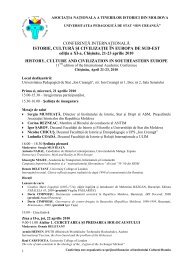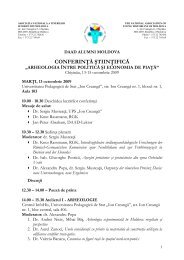Publicatie cu continut integral - Asociatia Tinerilor Istorici din Moldova
Publicatie cu continut integral - Asociatia Tinerilor Istorici din Moldova
Publicatie cu continut integral - Asociatia Tinerilor Istorici din Moldova
Create successful ePaper yourself
Turn your PDF publications into a flip-book with our unique Google optimized e-Paper software.
In Ukraine it is limited by the system’s discrepancies, visas, economic characteristics of the country, eventually,<br />
difference between life standards in Ukraine and EU countries. But, as we’re talking about internationalization<br />
of education, state’s efforts should be exclusive.<br />
The universities’ appeal for students is important ponderable complex component, which includes career prospect<br />
(which’s given by the university), quality and studdying cost, resi<strong>din</strong>g cost, household services’ availability,<br />
stipendium programs presence, European and global values’ respect, interethnic and religious conflicts’ absence,<br />
European educational standards conformity.<br />
The employment is a third principle, on which grounds maintenance of the young man’s rights for transnational<br />
education.<br />
The Bologna declaration proclaimed that the work opportunity – is a main question for higher institutions in<br />
Europe; it is the strategic aim, which has no alternative. The employment is an indicator of all the Bologna process<br />
successes. It is important because in dis<strong>cu</strong>ssions about expedient term of studdying at any level the participants<br />
made a conclusion, that a man, using a «training through all life» principle, must study until he find the job.<br />
Thus, higher educational level of the European space can rank the states, which completely assist student’s<br />
self-government, which is mainly provided with a gold triad – mobility, appeal, employment.<br />
It is state’s prerogative, competence and duty before Ukrainian youth, Ukrainian education system and the<br />
European commonwealth.<br />
Here we must pay attention at the system of higher education of Ukraine. The structure of the higher education<br />
of Ukraine was built up accor<strong>din</strong>g to the structure of education in the developed countries of the world as<br />
determined by UNESCO, UN and other international organizations. The higher education constitutes <strong>integral</strong><br />
part of the system of education of Ukraine as provided for by the Law of Ukraine «On Education». It ensures the<br />
fundamental scientific, professional and practical training by the following educational and qualification degrees:<br />
«Junior specialist», «Bachelor», «Specialist», «Master».<br />
The higher education is received in high educational institutions of the respective levels of accreditation on the<br />
basis of: basic general secondary education, complete general secondary education and educational-qualification<br />
degrees «Junior specialist» and «Bachelor», as well as «Specialist», «Master» as postgraduate education.<br />
Training of specialists in higher educational institutions may be carried out with the interruption of work (daytime<br />
education), without interruption of work (evening, correspondence education), by the combination of these<br />
two forms, and for certain professions – without atten<strong>din</strong>g classes.<br />
Admission of citizens to higher educational institutions is made on the competitive basis accor<strong>din</strong>g to skills<br />
and regardless of the form of ownership of an educational institution and sources of payment for education.<br />
There are four levels of accreditation established pursuant to the status of higher educational institutions:<br />
– first level – technical school, vocational school and other higher educational institutions equated to them<br />
(near 50%);<br />
– second level – collegee and other higher educational institutions equated to it (near 35%);<br />
– third and fourth levels (depen<strong>din</strong>g on the results of accreditation) – institute, conservatory, academy, and<br />
university (near 15%).<br />
Higher educational institutions train specialists pursuant to the following educational and qualification levels:<br />
– junior specialist – is provided by technical and vocational schools, other higher educational institutions of<br />
the first level of accreditation;<br />
– bachelor – Is provided by colleges and other higher educational institutions of the second level of accreditation;<br />
– specialist, master – are provided by higher educational institutions of the third and fourth levels of accreditation.<br />
The level system of higher education lies in the receipt of different educational and qualification levels at the<br />
respective stages (phases) of higher education.<br />
Taking into account the structure of higher education, its first phase contemplates the receipt of higher education<br />
of the educational-qualification level «Junior specialist»; the second phase – «Bachelor» (basic higher education);<br />
the third phase – «Specialist», and «Master» (complete higher education).<br />
– 1 –
















